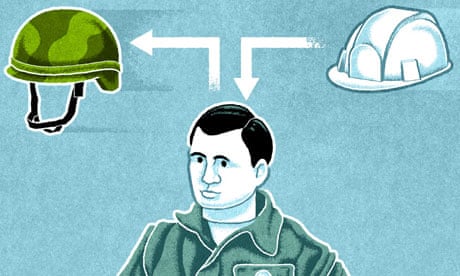Amid the plethora of conspiracy theories about 9/11, one I have not yet seen is that Osama bin Laden was a Chinese agent. Yet objectively, comrades – as communists used to say – one could argue that China has been the greatest beneficiary of America's decade-long reaction to those Islamist stabs at her heart.
Put it this way: When the anniversary articles come to be written on 11 September 2031, will commentators look back on a 30 years war against Islamist terrorism, comparable to the cold war, as the defining feature of world politics since 2001? I think not. They will most likely see this longer period as being defined by the historic power shift from west to east, with a much more powerful China and a less powerful United States, a stronger India and a weaker European Union.
As the Stanford historian Ian Morris points out in his mind-stretching book Why the West Rules – for Now, this geopolitical shift will occur within the larger frame of an unprecedented rate of technological advance, on the bright side, and an unprecedented array of global challenges, on the dark side.
Of course, this is only historically informed guesswork. But if things develop in anything like this direction (or in another direction unrelated to Islam) then the post-9/11 decade in American foreign policy will look like a detour – a massive, consequential detour, to be sure – rather than history's main road.
Moreover, if the Arab spring fulfils its modernising promise, the terrorist attacks on New York, Madrid and London will look more than ever like blasts from the past: an ending, not an opening. Even if the Arab spring wanes into an Islamist winter, and neighbouring Europe faces multiple threats as a result, this still does not mean that the struggle with illiberal and violent Islamism will be the defining feature of the next decades. Violent Islamism will remain a significant threat, but not, I suggest, the defining one – and particularly not for the US.
We can explore the same thought by means of a "what if". To the extent that the administration of George W Bush had a geopolitical worldview in the summer of 2001, it was focused on China as the US's new strategic competitor. What if the 9/11 attacks had not happened, and the US had continued to concentrate on the competition with China? What if it had realised how the west's own victory at the end of the cold war, and the resulting globalisation of capitalism, had unleashed economic forces in the east which would become the greatest long-term challenge to the west? What if Washington had concluded that this competition required not more military might, but more and smarter investment in education, innovation, energy and the environment, and the full unfolding of America's soft power? What if it had recognised that, faced with the renaissance of Asia, the relationship between consumption, investment and savings inside the US had to be rebalanced? What if its political system and leadership had enabled it to act effectively on those reality-based conclusions?
Even then, China and India would be rising. Even then, power would be shifting from west to east. Even then, we would face global warming, water shortage, pandemics, and all the other new horsemen of the apocalypse. But how much better shape the west, and especially the US, would be in.
End of "what if". The attacks happened; America was bound to respond them. An administration that had previously been casting around for an overall direction found it with a vengeance. Ten years on, we can say that the threat from al-Qaida has been significantly reduced. It has not been eliminated, that is not what happens with terrorism, but reduced. That is an achievement, but at what a cost.
America fought two major wars, one of necessity, in Afghanistan, one of choice, in Iraq. That in Afghanistan might have been over sooner, at less cost, and with a better result, if the Bush administration had not hared off into Iraq. The US has done damage to its own reputation and soft power (the power to attract) through such horrors as Abu Ghraib.
Meanwhile, and partly as a result of what has happened in this decade, nuclear-armed Pakistan is a greater danger than it was 10 years ago. In the wider Muslim world, including Muslim communities in Europe, there are contradictory tendencies. We can point to evidence of liberalising modernisation, both in the Arab spring and among Muslims in Europe, but also, as in Pakistan and Yemen, of further Islamist radicalisation.
A major research project on the Costs of War at Brown University records that over these 10 years "more than 2.2 million Americans have gone to war and over a million have returned as veterans". It estimates the overall, long-term economic costs so far incurred as a result of the wars in Afghanistan, Iraq, Pakistan and other theatres of counter-terrorist action at between $3.2 and $4 trillion. On its projections of likely future activity until 2020, that could rise to as much as $4.4tn. Experts can argue about the numbers, but there is no doubt that they are huge. In round figures, this amounts to something like a quarter of the US's soaring national debt, which itself is heading up towards 100% of GDP.
Yet this is nothing like a full accounting of what economists call the opportunity cost. It's not just a matter of how much investment in human resources, skilled jobs, infrastructure and innovation the US could have bought for $4tn – or even for half that amount, if you make the generous assumption that $2tn was actually needed to reduce the terrorist threat to the US by military, intelligence and homeland security means.
Above all, it's the opportunity cost in terms of national focus, energy and imagination. If you want to understand a country, ask who its heroes are. In this decade, the US has had two kinds of hero. One kind is the businessman-innovator: Steve Jobs, Bill Gates. The other is the warrior: the marine, the Navy Seal, the firefighters, all "our men and women in uniform". On CNN the other day (not Fox News) I actually heard the anchorwoman use the phrase "our warriors", as if it were a neutral, newscaster's term.
And when you hear some of those stories of individual bravery by Americans in uniform, they are incredible, inspiring, humbling. (Watch Jon Stewart's Daily Show interview with Sergeant Leroy Petry for an example.) That needs to be said clearly on this anniversary. But I find myself wondering what kinds of jobs – if any – these brave men and women will come back to. What kind of homes, lives, schools for their children? Opinion polls suggest that is what a great many Americans are wondering too. Their priorities are now back at home.
What president Barack Obama says this week in his special address to Congress about job creation will be more important to them than even the most eloquent words he might muster when he speaks in Washington's earthquake-damaged National Cathedral on the September 11 anniversary this Sunday. Honour to those warriors, but the heroes America needs now are the heroes of job creation.

